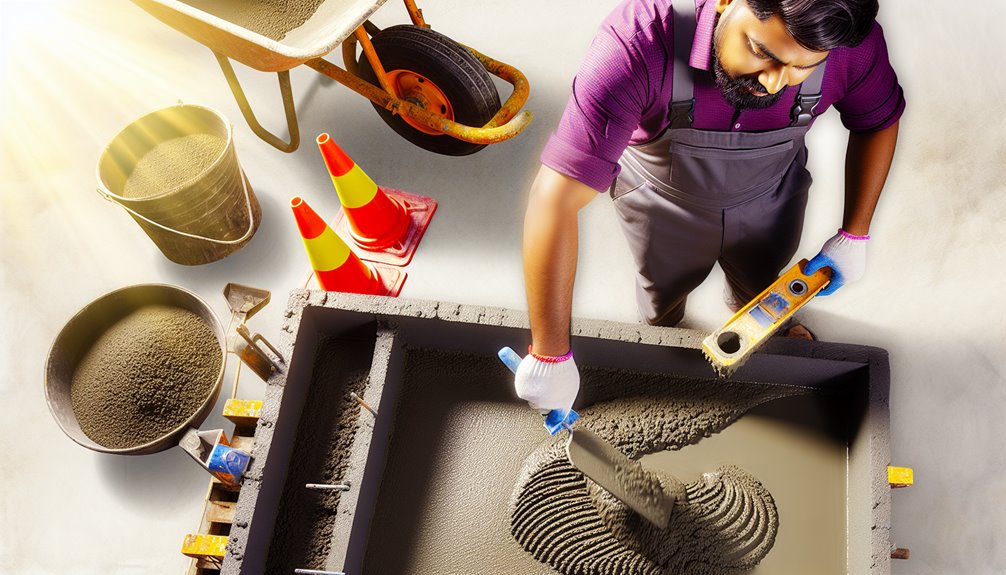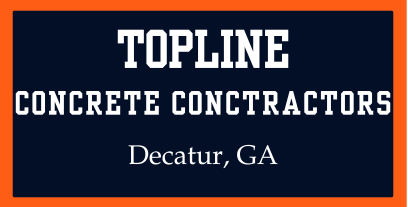
When you think about professional concrete contractors, it's easy to focus on the final product, but the skills behind that success are just as important. You need a solid grasp of concrete materials and mix design, along with expertise in surface preparation and formwork techniques. It's also critical to stay informed about safety regulations and to communicate effectively with your team and clients. Each of these skills plays an essential role in ensuring a project's success, yet there's much more to explore that can set you apart in this competitive field.
Knowledge of Concrete Materials
When it comes to concrete contracting, understanding the materials you're working with is vital. You'll need to grasp various concrete properties to guarantee your projects stand the test of time. For instance, knowing the water-to-cement ratio can greatly affect the strength and durability of your finished product. The right balance can lead to a robust structure that withstands environmental stressors.
Material durability is another key aspect. You should be familiar with additives that enhance concrete's resistance to weather conditions, chemicals, and wear. If you choose the wrong materials, you risk compromising the integrity of your work, which can lead to costly repairs down the line.
Additionally, understanding the impact of aggregates on your concrete mix is essential. Different sizes and types of aggregates can affect both the strength and workability of your mix. By knowing how these materials interact, you can optimize your mix for specific applications.
Mix Design Expertise
When it comes to mix design expertise, understanding proportions and ratios is essential for achieving the right concrete strength and durability.
You'll also need to familiarize yourself with various admixtures that can enhance performance and workability.
Mastering these elements will set you apart as a skilled concrete contractor.
Proportions and Ratios
In the world of concrete contracting, understanding proportions and ratios in mix design is vital for achieving the desired strength and durability of the final product.
You need to master proportion calculations to guarantee that each component—cement, aggregates, and water—blends perfectly. Getting these ratios right influences the concrete's workability, setting time, and overall performance.
When you use different mixing techniques, you can affect the consistency and quality of the mix. For instance, dry mixing can lead to uneven distribution of materials, while wet mixing can enhance bonding.
The key is to find the right balance that matches your project's specifications.
As you work on your mix designs, always remember that even slight variations in proportions can lead to significant differences in the finished product.
It's essential to calculate and adjust these ratios based on factors such as environmental conditions and the intended use of the concrete.
Admixture Knowledge
Mastering proportions and ratios in mix design sets the foundation for understanding admixtures and their role in concrete work. Admixtures are essential additives that enhance concrete's performance, durability, and workability.
As a concrete contractor, you'll encounter various admixture types, including plasticizers, accelerators, retarders, and air-entraining agents. Each type serves a specific purpose, and knowing when to use them can greatly impact your project's success.
For instance, plasticizers improve workability, making it easier to pour and finish concrete. Accelerators are critical when you need faster curing times, while retarders can help during hot weather, preventing premature setting. Air-entraining agents introduce tiny air bubbles, increasing freeze-thaw resistance, which is important in colder climates.
Understanding admixture applications allows you to tailor each mix to the unique demands of your project. You'll be able to adjust your formulas to meet environmental conditions or specific structural requirements, ultimately delivering high-quality results.
Surface Preparation Skills
When you're preparing a surface for concrete, cleanliness is key to ensuring a strong bond.
Choosing the right tools and mastering leveling techniques can make a significant difference in the final outcome.
Let's explore how these skills can elevate your concrete projects.
Importance of Clean Surfaces
Clean surfaces are essential for successful concrete projects, guaranteeing that the material adheres properly and performs as intended. If you want to achieve high-quality results, you must address surface contamination before pouring concrete.
Using effective cleaning techniques, like pressure washing or sandblasting, can remove dirt, oils, and other contaminants that compromise adhesion.
Proper substrate preparation sets the stage for peak surface durability. When you start with a clean base, you enhance finishing consistency, leading to a smoother, more uniform appearance.
This attention to detail not only boosts surface aesthetics but also guarantees that your project withstands wear and tear over time.
Incorporating robust maintenance practices, such as regular cleaning and inspections, helps maintain that pristine surface throughout its lifespan.
Additionally, exploring various sealing options can protect the concrete from future contamination, enhancing both durability and appearance.
Proper Tool Selection
Selecting the right tools for surface preparation is vital to achieving ideal results in your concrete projects. You need to take into account the specific requirements of each job, whether it's grinding, polishing, or cleaning. Using the appropriate tools not only helps in getting the job done efficiently but also contributes to the longevity of your surfaces.
Invest in high-quality tools tailored for concrete work. Tools like concrete grinders, shot blasters, and scrapers can greatly enhance your surface preparation.
Don't overlook tool maintenance, as regular checks and servicing can prevent downtime and costly repairs. Keeping your equipment in top shape guarantees consistent performance, which is fundamental for quality results.
Sometimes, it's wise to think about tool upgrades. New technology often leads to more efficient and effective tools that can save you time and effort.
Assess your current toolset regularly, and if you find that certain tools aren't meeting your needs, it might be time to make an upgrade. By selecting the right tools and maintaining them well, you'll set the foundation for a successful concrete project.
Techniques for Leveling
Achieving a level surface is vital for any concrete project, as it guarantees proper drainage and a smooth finish.
To start, assess the area you'll be working on. Use a leveling instrument or a laser level to identify any high or low spots. When you find these, you'll need to make slope adjustments to verify evenness.
Once you've pinpointed the necessary adjustments, you can begin the leveling process. If there are low spots, fill them with a concrete mix or leveling compound. For high areas, you might need to grind down the surface.
Keep in mind that maintaining proper surface tension during this process is essential; it prevents the concrete from settling unevenly as it dries.
As you work, periodically check your levels. This will help you catch any discrepancies early on, allowing for timely adjustments.
Remember, patience is key. Rushing through this phase can lead to long-term issues like water pooling or cracking.
Formwork Techniques
Effective formwork techniques are vital for any concrete contractor aiming to secure a successful pour. To start, you need to choose the right formwork materials—these can range from timber to steel or plastic. Each material has its pros and cons, so consider factors like cost, durability, and ease of installation.
Next, focus on your formwork design. It should be strong enough to withstand the weight of the wet concrete and any environmental stresses. You'll want to confirm that your design allows for easy assembly and disassembly, minimizing time on-site.
Properly securing your formwork is essential; this prevents movement during the pour, which can lead to structural weaknesses. Use bracing or stakes as needed to keep everything stable.
Don't forget about the importance of alignment and leveling. Verify that your forms are straight and at the correct height to achieve the desired finish.
Lastly, always check for leaks. Even small gaps can lead to complications, so seal any potential issues before pouring.
Mastering these formwork techniques will notably enhance your efficiency and the quality of your concrete projects.
Finishing Methods
Once the formwork is in place and the concrete has set, you'll need to focus on finishing methods to achieve a smooth, durable surface.
Start by employing trowel techniques to level the surface and eliminate imperfections. Consider different texture finishes to enhance both aesthetics and grip, depending on the project's needs.
If you're aiming for a decorative look, decorative overlays can add color and pattern. For a polished appearance, explore polishing methods that provide a sleek finish while increasing durability. You can also use stamping patterns to create the visual appeal of natural materials, such as stone or wood.
When applying color, consider color application techniques that guarantee an even distribution throughout the surface. Jointing strategies are essential for controlling cracking and guaranteeing longevity, so be sure to plan your joints effectively.
After finishing the surface, don't forget about sealing options to protect against moisture and stains.
Utilize appropriate finishing tools to achieve the desired results, and explore various surface treatments that enhance the concrete's performance. Each method contributes to not just the appearance, but the overall longevity of your concrete work.
Knowledge of Curing Processes
Understanding curing processes is essential for any concrete contractor.
You need to know the various methods, how environmental factors impact your work, and the importance of timing and temperature on curing success.
Mastering these elements can greatly enhance the durability and quality of your concrete projects.
Curing Methods Overview
How do you guarantee that freshly poured concrete achieves its maximum strength and durability? One key factor is proper curing methods. Effective curing involves managing moisture levels and temperature to promote concrete hydration.
You'll want to implement evaporation control techniques, especially in hot or windy conditions, to prevent rapid water loss.
Using curing compounds is an excellent way to enhance water retention. These compounds form a film over the surface, reducing evaporation and maintaining moisture levels.
Additionally, curing blankets can be beneficial for temperature monitoring and insulation, particularly in cooler climates. They help maintain ideal curing conditions by keeping the concrete warm and protected.
Curing duration is vital; it's recommended to cure concrete for at least a week, but this can vary depending on the site conditions and the specific project requirements.
Consistent monitoring during this period guarantees that the curing techniques you apply are effective and that the concrete maintains the necessary moisture for proper strength development.
Environmental Impact Considerations
Considering environmental impact is essential when selecting curing processes for concrete. You need to adopt sustainable practices that align with current environmental regulations. By choosing eco-friendly materials, you can greatly reduce your carbon footprint while ensuring compliance with green certifications.
Effective waste management is imperative in this process. Implementing strategies for resource conservation can minimize the amount of waste generated on-site. Additionally, consider site preservation during your curing methods to protect local biodiversity. This approach not only supports the environment but can also enhance your project's reputation.
Energy efficiency plays an important role in curing processes as well. By utilizing innovative techniques that require less energy, you'll contribute to a greener construction industry. This can also lead to cost savings for you and your clients.
Lastly, always keep biodiversity considerations in mind. By making informed decisions about your curing processes, you're not just fulfilling a professional obligation; you're actively participating in the conservation of the environment. In doing so, you'll position yourself as a responsible contractor committed to a sustainable future.
Timing and Temperature Effects
Getting the timing and temperature right during the curing process is fundamental for achieving ideal concrete strength and durability. As a concrete contractor, you need to understand how temperature fluctuations can impact the curing process. If the temperature is too low, the hydration process slows down, leading to weaker concrete. Conversely, high temperatures can cause rapid moisture loss, resulting in cracking and reduced strength.
To combat these issues, timing adjustments are essential. You should monitor weather conditions closely and adjust your curing methods accordingly. For instance, during colder months, consider using insulated blankets or heated enclosures to maintain optimal temperatures. In warmer conditions, you might need to apply curing compounds or implement frequent water spraying to keep the surface moist.
Additionally, it's critical to pay attention to the curing duration. Insufficient curing time can prevent the concrete from reaching its full potential. Make sure to follow industry guidelines for curing duration based on the specific mix design and environmental conditions.
Equipment Proficiency
Mastering equipment proficiency is vital for concrete contractors to deliver high-quality results efficiently. You need to be skilled in using various tools and machinery, from mixers to vibrators, making certain they operate at peak performance.
Regular equipment maintenance is imperative to prevent breakdowns and delays on the job site. By keeping your tools in top shape, you not only extend their lifespan but also assure consistent results.
Additionally, you should prioritize equipment calibration. Proper calibration guarantees that your machinery performs accurately, reducing the risk of errors that could compromise the quality of your work. Familiarize yourself with the specific requirements of each piece of equipment, and don't hesitate to consult the manufacturer's guidelines.
Investing time in understanding how to operate and maintain your equipment effectively can greatly impact your efficiency and the quality of your output.
When you're confident in your machinery, you can focus more on the artistry and precision of your concrete work. Remember, the right skills in equipment proficiency can set you apart in a competitive industry, guaranteeing your projects are successful every time.
Safety Regulations Awareness
While working with concrete can be rewarding, being aware of safety regulations is vital to protect yourself and your team. You need to understand that safety isn't just a suggestion; it's a requirement. Familiarizing yourself with local and national safety guidelines guarantees regulatory compliance, minimizing risks on the job site.
Participating in safety training programs is essential. These programs educate you on best practices, proper equipment use, and hazard recognition. When you're well-trained, you can identify potential dangers before they escalate, helping to prevent accidents and injuries.
Always keep personal protective equipment (PPE) within reach and verify it's in good condition. This includes hard hats, gloves, safety goggles, and steel-toed boots. Remember, even minor oversights can lead to serious injuries.
Stay updated on changes in regulations, as they can evolve over time. Regularly reviewing safety protocols with your team fosters a culture of safety and accountability. Make it a point to hold safety meetings and encourage open discussions about safety concerns.
Problem-Solving Abilities
In the fast-paced world of concrete contracting, effective problem-solving abilities are vital for overcoming challenges that arise on the job site. You'll often encounter unpredictable issues, from weather-related delays to equipment malfunctions. With solid critical thinking skills, you can analyze situations quickly and determine the best course of action.
When faced with a problem, it's important to employ troubleshooting strategies that help you pinpoint the root cause. For example, if a concrete mix isn't setting correctly, you should assess the components, including the mix ratio and environmental factors. By systematically examining each aspect, you can devise a solution that guarantees project quality and timeliness.
Additionally, being proactive in identifying potential issues before they escalate can save you time and resources. Regular site inspections and equipment checks can help you foresee complications, allowing you to address them head-on.
Ultimately, honing your problem-solving abilities not only enhances your efficiency but also builds trust with clients and team members. When they see you navigate challenges effectively, they'll be more confident in your skills as a professional concrete contractor.
Communication and Collaboration Skills
Strong communication and collaboration skills are essential for concrete contractors to succeed in their projects. You need to practice active listening to fully understand your team's ideas and concerns. This not only enhances team dynamics but also fosters a positive work environment.
When conflicts arise, effective conflict resolution strategies will help you address issues promptly, keeping the project on track. In project management, clear communication is key. You must convey project goals and timelines to your team, ensuring everyone is on the same page.
Strong client relations are also important; being responsive and transparent builds trust and encourages repeat business. Utilize feedback mechanisms to gather insights from clients and team members alike, which can guide improvements in future projects.
Negotiation skills come into play when discussing contracts or resolving disagreements. You'll often need to reach compromises that satisfy all parties involved.
Furthermore, cultural awareness is essential in today's diverse workforce. Understanding and respecting different perspectives can enhance collaboration, leading to more innovative solutions.
Frequently Asked Questions
What Certifications Are Important for Professional Concrete Contractors?
To succeed as a concrete contractor, you'll want to focus on relevant certification programs and understand local licensing requirements. These credentials not only enhance your skills but also boost your credibility in the industry.
How Can Contractors Stay Updated on Industry Trends?
To stay updated on industry trends, you can enroll in online courses and subscribe to industry publications. Engaging with these resources helps you gain insights, learn new techniques, and remain competitive in the evolving market.
What Are Common Mistakes to Avoid in Concrete Work?
When working with concrete, avoid common mistakes like improper mixing and inadequate curing. These issues can lead to weak structures and costly repairs. Always follow best practices to guarantee your project's durability and longevity.
How Do Contractors Manage Project Timelines Effectively?
To manage project timelines effectively, you'll need strong time management skills. Use scheduling techniques like Gantt charts and regular progress check-ins to keep the project on track and adjust as needed for unforeseen delays.
What Role Does Customer Service Play in Concrete Contracting?
Customer service's essential in concrete contracting. You need clear client communication to understand service expectations. Meeting those expectations fosters trust, encourages repeat business, and enhances your reputation, ultimately leading to successful projects and satisfied clients.
Conclusion
In summary, mastering the essential skills of a professional concrete contractor is crucial for your success. By honing your knowledge of concrete materials, mix design, and surface preparation, you'll guarantee the durability and precision of your projects. Emphasizing safety and effective communication will not only protect your team but also build strong client relationships. By continuously improving these skills, you'll deliver high-quality results that satisfy your customers and elevate your reputation in the industry.





